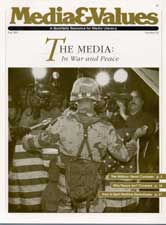More Diversity Found in Coverage
|
This article originally appeared in Issue# 56
|
With Canadian troops serving in the United Nations task force and U.S. television beamed across the border, Canadian perspectives of Gulf War coverage were often similar to US views.
Like Americans, most Canadians probably believe that authorities are justified in muzzling the news for security reasons in wartime--even though no one can point to a single Canadian military life lost as a result of disclosure of sensitive information since at least 1946.
The probably related belief that the media "lost" the Vietnam War helps to justify censorship, even though many post-Gulf War viewers, both American and Canadian, agree that censorship was a major flaw in coverage of the conflict.
But differences in perspective still exist and at least some of them can be traced to a greater Canadian openness to war criticism and anti-war coverage. A few months after the war ended a spokesman for the Canadian Arab Federation, for example, said Arab viewpoints were more fully represented on the publicly-owned Canadian Broadcasting Corporation than on either US mainstream media or on privately-owned Canadian media outlets.
This points to one of the relevant media differences between the two countries: there's nothing comparable to the CBC south of the border. As a wholly government-owned network accountable to Parliament, the CBC doesn't face the same commercial and viewer pressures as, say, PBS. On coast-to-coast CBC Radio programs such Morningside (9 a.m. to noon every weekday), Ideas and Prime Time (an hour every weeknight) and Sunday Morning (9 a.m. to noon on Sundays), effective opposition voices are frequently heard during in-depth features. One-hour documentaries are not uncommon.
At the onset of the war, for instance, CBC Radio inaugurated a 24-hour-a-day schedule. It became a radio version of CNN, but with more questions asked and more background provided, it was easier for viewers to draw their own conclusions.
In Alphabet City, a new Canadian critical journal spawned by reaction to Gulf War media coverage, CBC-TV News chief correspondent and anchorperson Peter Mansbridge describes the creation of a news team of researchers from varied Middle Eastern backgrounds "to examine the situation from as many perspectives as possible." He recounts the CBC commitment to "cover this conflict from a Canadian perspective," a prewar commitment the network honored.
Peter Desbarats, dean of the Graduate School of Journalism at the University of Western Ontario told the audience of a Media File (CBC Radio) special on Gulf War coverage during July 1991 that the conflict was "a great victory for American arms and a total defeat for American news media. We in Canada shared in that military victory and in that defeat."
The special included a long interview with US media critic Edward Herman, who said the US mainstream media were "bamboozled" by White House "big lies" about the war. Canadian mainstream media, especially the CBC and The Toronto Star, the country's largest circulation daily, were less taken in. Simply put, Canadian media provide more diversity of coverage and opinion than their US counterparts. Personally, as a Canadian media consumer, I'll take diversity of opinion over so-called objectivity any time.



